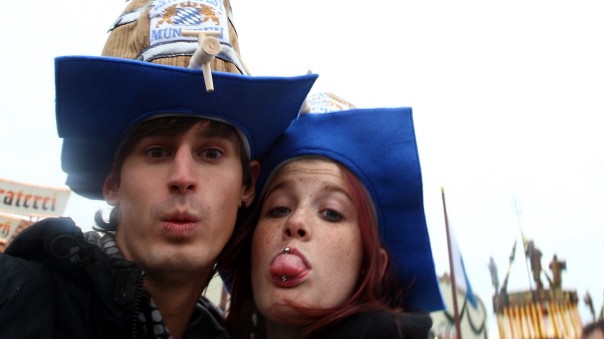A
Anbandeln (= to flirt with)
After drinking a Maß beer the Oktoberfest visitors inhibitions decrease and they start to flirt with members of the opposite sex. As a token of affection you might like to give a "Lebkuchenherz" (A heart shaped gingerbread)
After-Wiesn
When the tents close at 11pm most of the visitors are in no mood to return home so they usually continue partying in a local bar or club. Those who hope to see one or two famous people should go to the chicest P1 disco. The clubs Zoozie'z and Substanz are also popular for after Wiesn.
B
Breze
A Breze is a yeast bread pretzel, in the town bakeries you can only buy the small hand sized variety but in the beer gardens and at the Oktoberfest you can buy a huge Riesenbreze (giant pretzel) together with a Maß of beer and a side dish of roast chicken this is the Bavarian's preferred beer-festival fare.
Beer
Beer is only available in one-litre glass, called a Maß. For the Oktoberfest the local breweries create a special beer which has a higher percentage of alcohol.
D
Dirndl
Dirndl is the traditional dress for women, the word Dirndl comes from old Bavarian and means girl or maiden.
H
Hendl
Hendl is grilled chicken, which is on offer over most of the Oktoberfest. It tastes spectacular in combination with beer and Breze.
K
Käfer
The tent of Käfer, Bavaria's own king of delicatessen, can surely be called the V.I.P. tent. The crowd ranges from famous actors, to soccer stars, and other celebrities. The doors open till 1.00 am, yet to get in is a little difficult. If you don't have a invitation, you have to be either really famous or really beautiful to get around the bouncer.
L
Lebkuchenherz
From many stalls at the Oktoberfest you can buy gingerbread hearts hand decorated with multi coloured sugar icing script. They are given as a sign of affection. (Tip: Don't eat it, it is a keepsake!) While " Spatzerl" and "Schatzerl" = (little sparrow and little treasure) are relatively innocent. "I mog di" (= I Like you) or "Ich liebe dich" (= I love you) is clearly a bit stronger. For the folks back home you can buy a souvenir heart with the writing "Grüße aus München" = Greetings from Munich.
Lederhosen (= leather trousers)
Lederhosen are an essential part of the men's traditional dress, these are available in different lengths, but knee length being the most commonly seen. They are usually combined with a white shirt, knee length socks and special shoes (called Haferlschuhe / brogues).
M
Maß / Maßkrug (=Litre-Stein)
In Bavaria you drink beer out of a Maßkrug, which holds one litre of beer. You drink directly from the big glass (No smaller glasses will be provided) When you want to order a beer, you simply say to the waitress "A Maß, bittschön"
N
Noagerl
Noagerl is a Bavarian expression and means the left over remains or beer dregs. This word explains to the waitress that the beer has been left standing too long, is warm or flat and no longer drinkable, so she will take it away.
P
Prost
Prost! Is a toast used by Bavarians. When the band play a fanfare that is called "Ein Prosit der Gemütlichkeit" you chink your glasses while looking the person in the eyes and say Prost! There is another Bavarian version that goes, "Oans, zwoa, g'suffa!" (One, two, sozzled)
Warning: Prost has nothing to do with Brust (breast) even if it sounds similar!
P1 (pronounced "p eins")
This is Munich's legendary Disco, a place where celebrities like to go. For example; Oli Kahn, Bayern Munich FC's ex goalkeeper. Because the in crowd like to keep to themselves, the doormen are strict and not everyone gets in. You must be well dressed and you shouldn't be too drunk.
S
Steckerlfisch
Steckerlfisch is a grilled mackerel fish on a stick (Bavarian for stick is Steckerl). It is served in beer gardens and at folk festivals. Traditionally the fishes were caught in the local rivers and lakes.
T
Trachtenumzug (= traditional costume procession)
On the first Sunday of the Oktoberfest you will find the traditional costume procession parading through the inner city, taking part are bands, costume societies and folk clubs.
W
Wiesn
Wiesn is the Bavarian name for the Oktoberfest and comes from Theresienwiese the name of the place where annually the beer festival takes place. Wiese means meadow.
Wegen Überfüllung geschlossen (= closed due to over crowding)
This sign stands outside a tent when there are no places for new guests, unfortunately neither polite words nor flattery will persuade the massive door men to let you in.
Wildbieseln
Bieseln is Bavarian for urination and you should only go in the designated attended toilet areas, if you do your business somewhere else then this is a Wildbieseln and if caught peeing wild, you will be fined.
Zelt (= tent)
At the Oktoberfest, there are 14 big tents and some smaller ones. The basic rule can be summed up like this: The bigger the tent, the merrier the crowd. The largest tents offer up to 9000 places. The last call for beer in the evening is at 10.30 pm and the tents finally close at 11.00 pm.
Übersetzung von Steven Tucker




